
The United States Coast Guard (USCG) is the maritime security, search and rescue, and law enforcement service branch of the United States Armed Forces and one of the country's eight uniformed services. The service is a maritime, military, multi-mission service unique among the United States military branches for having a maritime law enforcement mission with jurisdiction in both domestic and international waters and a federal regulatory agency mission as part of its duties. It is the largest and most powerful coast guard in the world, rivaling the capabilities and size of most navies.

The Federal Emergency Management Agency (FEMA) is an agency of the United States Department of Homeland Security (DHS), initially created under President Jimmy Carter by Presidential Reorganization Plan No. 3 of 1978 and implemented by two Executive Orders on April 1, 1979. The agency's primary purpose is to coordinate the response to a disaster that has occurred in the United States and that overwhelms the resources of local and state authorities. The governor of the state in which the disaster occurs must declare a state of emergency and formally request from the President that FEMA and the federal government respond to the disaster. The only exception to the state's gubernatorial declaration requirement occurs when an emergency or disaster takes place on federal property or to a federal asset—for example, the 1995 bombing of the Alfred P. Murrah Federal Building in Oklahoma City, Oklahoma, or the Space Shuttle Columbia in the 2003 return-flight disaster.
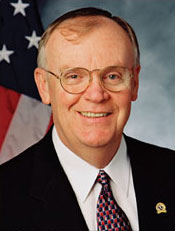
James Milton Loy is a retired admiral of the United States Coast Guard who served as the acting U.S. Secretary of Homeland Security in 2005 and U.S. Deputy Secretary of Homeland Security (DHS) from November 4, 2003, to March 1, 2005. Prior to his appointment as deputy secretary, he served as the second administrator of the Transportation Security Administration from 2002 to 2003, and before that as the commandant of the U.S. Coast Guard from 1998 to 2002.
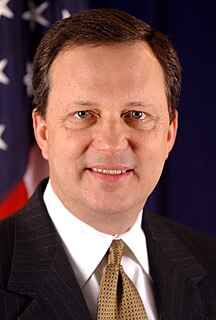
Michael DeWayne Brown is an American attorney and former government official who served as the administrator of the Federal Emergency Management Agency (FEMA) from 2003 to 2005. He joined FEMA as general counsel in 2001 and became deputy director the same year. Appointed in January 2003 by President George W. Bush to lead FEMA, Brown resigned in September 2005 following his controversial handling of Hurricane Katrina. Brown currently hosts a radio talk show on 630 KHOW in Denver, Colorado.
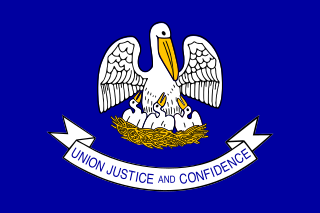
Criticism of the government response to Hurricane Katrina was a major political dispute in the United States in 2005 that consisted primarily of condemnations of mismanagement and lack of preparation in the relief effort in response to Hurricane Katrina and its aftermath. Specifically, there was a delayed response to the flooding of New Orleans, Louisiana.

This article contains a historical timeline of the events of Hurricane Katrina on August 23–30, 2005 and its aftermath.
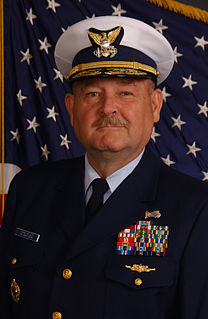
Thad William Allen is a former admiral of the United States Coast Guard who served as the 23rd commandant from 2006 to 2010. Allen is best known for his widely praised performance directing the federal response to hurricanes Katrina and Rita in the Gulf Coast region from September 2005 to January 2006, and for his role as National Incident Commander of the Unified Command for the Deepwater Horizon oil spill in the Gulf of Mexico in 2010. Robert J. Papp Jr. succeeded him as Commandant on 25 May 2010.

Robert David Paulison is an American former fire chief who served as the director of the Federal Emergency Management Agency (FEMA). Paulison was appointed by President George W. Bush on September 12, 2005 to replace the embattled Michael D. Brown, who resigned amid controversy over his handling of disaster relief in the aftermath of Hurricane Katrina. Prior to his appointment, Paulison was perhaps best known nationally for his 2003 advisory regarding household items to have on hand in case of terrorist attack. At the 2009 National Hurricane Conference, he announced he would resign January 21, 2009.

Vice Admiral John P. Currier was the 28th Vice Commandant of the United States Coast Guard. He assumed the position from Vice Admiral Sally Brice-O'Hara on May 18, 2012 and was relieved on May 20, 2014 by Vice Admiral Peter Neffenger.

Martha T. Rainville is a retired U.S. Air Force officer who attained the rank of major general. She was the first woman in U.S. history to become a state adjutant general when she served in that post with the Vermont National Guard.

Jody A. Breckenridge is a former commander of the U.S. Coast Guard's Pacific Area.
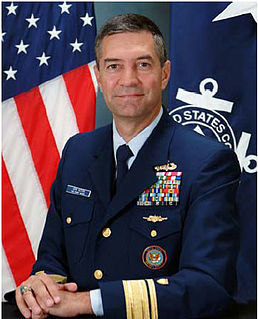
John C. Acton is a retired United States Coast Guard rear admiral who served as the Director of Operations Coordination for DHS. Acton formerly served as Director of the DHS Presidential Transition Team.

Nancy L. Ward was the Interim Administrator of the Federal Emergency Management Agency (FEMA), hand-picked by her predecessor, R. David Paulison to serve in his place after retiring on January 21, 2009. Prior to her selection by Paulison, Ward served as the FEMA regional director for region IX. She returned to this position in May 2009 after Craig Fugate was appointed as Administrator.

David Peter Pekoske is an American government official and retired U.S. Coast Guard vice admiral who has served as the seventh administrator of the Transportation Security Administration in the United States Department of Homeland Security (DHS) since 2017. He served as the acting deputy secretary of Homeland Security from April to November 2019 and again from January to June 2021. From January 20, 2021 to February 2, 2021 he served as acting secretary of homeland security, during the Senate confirmation of Alejandro Mayorkas. Pekoske retired with 33 years of active military service in 2010 as the 26th vice commandant of the Coast Guard.

Command Group, "CG", founded as Command Consulting Group, is an international security and intelligence consulting firm, founded in 2009, headquartered in Washington, D.C., United States. CG provides advisory services for governments, corporations, and high net worth individuals.

Peter Vance Neffenger is a United States Coast Guard Admiral and public servant who served as Administrator of the Transportation Security Administration from July 2015 to January 20, 2017.
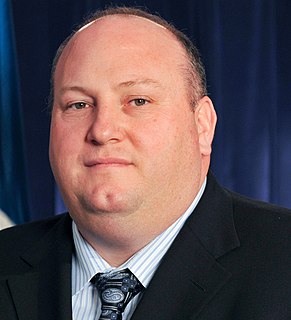
Robert J. Fenton Jr is an American governmental official who worked for the Federal Emergency Management Agency (FEMA) in 1996 and was appointed Regional Administrator for FEMA Region IX: Arizona, California, Hawaii, Nevada, and the Pacific Islands in July 2015. He had a leadership role in the development of the National Incident Management System and the National Response Framework.
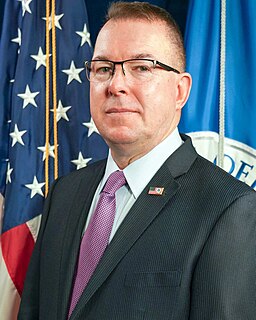
Peter Thomas Gaynor is an American Certified Emergency Manager who served briefly as Acting Secretary of Homeland Security under President Trump. Gaynor previously served as administrator of the Federal Emergency Management Agency (FEMA). He was appointed as Acting Administrator by President Donald Trump on March 8, 2019, and became Administrator on January 16, 2020.
Michael A. Sprayberry is an American emergency manager who served as the Director of Emergency Management in the North Carolina Department of Public Safety from 2013 to 2021. He oversaw the state's emergency response to several major disasters including Hurricane Matthew, Hurricane Florence, and the ongoing COVID-19 pandemic.


















